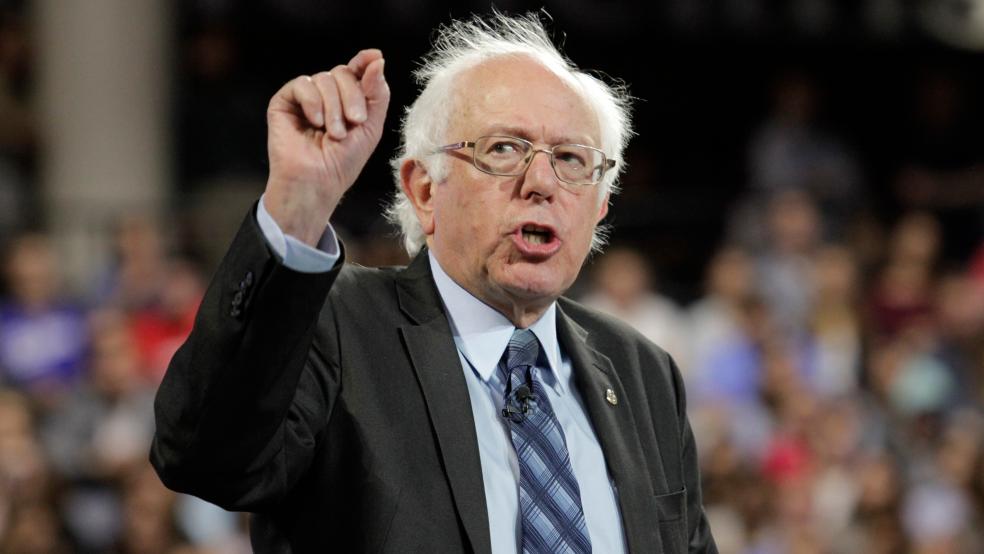Sen. Bernie Sanders has been riding a populist crest of anti-Wall Street sentiment in his surprisingly strong challenge to Hillary Clinton for the Democratic presidential nomination, and he appears to be upping the ante with little more than a month to go before the Iowa caucuses.
In a speech scheduled for Tuesday afternoon at a town hall meeting in Manhattan, Sanders will vow to break up some of the largest banks and financial institutions deemed “too big to fail” within a year of being elected president.
Related: Here’s What Bernie Sanders Would Do to the Fed
“If a bank is too big to fail, it is too big to exist. When it comes to Wall Street reform, that must be our bottom line,” the senator from Vermont will say in his speech, according to The Washington Post.
Sanders will tell the political gathering that, if he is elected president, he will order the Treasury Department within the first 100 days of his administration to draw up a “too big to fail” list of commercial banks, shadow banks and insurance companies whose failure would present a catastrophic risk to the U.S. economy, just as they did during the 2008 financial crisis that prompted a massive taxpayer-financed bailout.
In the years since that crisis, the nation’s biggest banks have grown substantially larger. Together, the top 10 largest banks -- ranging from giants like JPMorgan Chase, Bank of America, Citigroup and Wells Fargo to lesser institutions such as HSBC and Capital One, now hold $10.1 trillion in assets, according to Bankrate.
The six largest banks issue more than two-thirds of all credit cards and over 35 percent of all mortgages, Sanders notes. They also control more than 95 percent of all financial derivatives and hold more than 40 percent of all bank deposits.
Related: Clinton Facing a Long Fight as Sanders’ Fundraising Soars
Sanders is vowing that, within a year of taking charge, his administration would break up some of those financial institutions posing a “grave threat to the economy” by using the authority granted by the Dodd-Frank financial reform legislation. He will also reiterate his call for the reinstatement of the Glass-Steagall Act that separated commercial banking, investment banking and insurance services. Sanders and others have argued that the repeal of the law in 1999 under Democratic President Bill Clinton contributed to the global credit crisis.
Sanders has predicated his campaign against Hillary Clinton in part on his opposition to Wall Street. He has criticized Clinton and her husband for their close ties to Wall Street and reliance on financial executives for campaign contributions.
In his speech, Sanders will sharply denounce the 2008 government bailout of Wall Street and criticize Clinton for voting for it while she was a senator from New York. Clinton has sought to neutralize Sanders’ attacks with a series of proposals that would rein in the biggest banks.
“Wall Street cannot continue to be an island unto itself, gambling trillions in risky financial instruments,” Sanders intends to say in his New York speech.
Related: Hillary Clinton Gets a Taste of What Could Be a Painful 2016
Clinton in October unveiled a plan designed to discourage excessive risk-taking in the financial sector that calls for breaking up banks deemed too big to fail. The proposal would impose a risk fee on financial firms "that are too large and too risky to manage" and require them to reorganize, downsize or break apart, the Democratic presidential hopeful said. "I have a plan to build on the progress we've made under President Obama and do just that," Clinton said at the time. "We can't go back to the days when Wall Street could write its own rules."
Moreover, Sanders’ ideas for using the 2010 Dodd-Frank Wall Street Reform Act to dismantle the riskiest big banks has come under attack from some banking experts and academics as misguided and impractical.
An October 2014 paper published by the Brookings Institution and the Bipartisan Policy Center’s Financial Regulatory Reform Initiative concluded that reforms undertaken since the financial crisis under Dodd-Frank “have gone a long way toward addressing the [too big to fail] issue.”
“Proposals to break up major financial institutions entail greater costs than benefits they would provide and are potentially outright counterproductive,” wrote economists Martin Neil Baily, Douglas J. Elliott and Phillip L. Swagel. “It would be better to allow Dodd-Frank and other U.S. and global reforms to work as intended, rather than to break up the largest banks. Indeed, if Dodd-Frank works as intended, then there is no need for a break up.”





